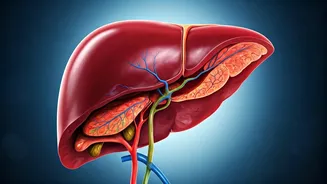Liver’s Amazing Abilities
The liver is a remarkable organ with the ability to regenerate itself, though this regenerative capacity isn't limitless. It faces a constant barrage of
substances from your diet and environment, making it crucial to understand its functions and how to support its health. The liver serves as your body's primary filtration system. It breaks down and processes everything that you consume. This means that every food item, drink, and even supplements you take will pass through it. This continuous workload highlights the importance of maintaining a healthy liver.
Dietary Impacts on Liver
What you eat directly influences your liver's health. The liver is the first stop for nearly everything you consume, from the morning coffee to the evening meal. Certain substances can either support the liver's function or place undue stress on it. For example, some studies suggest that coffee could be beneficial for liver health. This is because coffee consumption is associated with a lower risk of certain liver conditions. Conversely, some food items can be detrimental to the liver. It's important to be mindful of your dietary choices to protect this vital organ.
Hidden Liver Killers
Many things in your environment can silently harm your liver. These 'liver killers' are often present in everyday life and can slowly undermine its health. Identifying and minimizing exposure to these potential hazards is a significant step towards liver health. Some common culprits include processed foods, excessive alcohol, and certain medications. It is important to be aware of the impact of these factors. Moreover, it is important to take measures to reduce the consumption of these substances.
The Liver's Internal Clock
The liver, like other parts of your body, operates according to a natural internal clock known as the circadian rhythm. This rhythm regulates various biological processes. Its synchronization is critical for optimal liver function. Disruptions to this rhythm, such as those caused by poor sleep or irregular eating patterns, can negatively affect liver health. Maintaining a regular sleep schedule and eating meals at consistent times can help support the liver's natural processes. This will also ensure that the liver functions effectively and efficiently.
Sleep and Liver Health
Getting inadequate sleep can interfere with the liver's ability to repair itself. Your body repairs and regenerates tissues during sleep, including the liver. When sleep is disrupted, this repair process is hampered, leading to potential damage. Prioritizing quality sleep is crucial for supporting liver health. Aim for a consistent sleep schedule to help your body regulate the repair cycle. Ensuring adequate rest can help the liver function optimally.
Importance of Hydration
Adequate hydration is critical for the detoxification processes carried out by the liver. Water is essential for flushing out toxins and waste products. When you are dehydrated, the liver has to work harder. This puts extra strain on the organ, and might impair its function. Drinking sufficient water throughout the day can support the liver's detoxification efforts. It helps maintain the liver's health and ensures its smooth operation.
Supplement Safety Concerns
While many people take supplements for various health reasons, it's important to be cautious. Not all supplements are safe for the liver. Certain supplements can potentially cause liver damage. This is particularly true if the dosage is incorrect or if the supplement contains harmful ingredients. Always consult with a healthcare professional before starting any new supplement regimen. It is important to ensure your liver’s health.



















